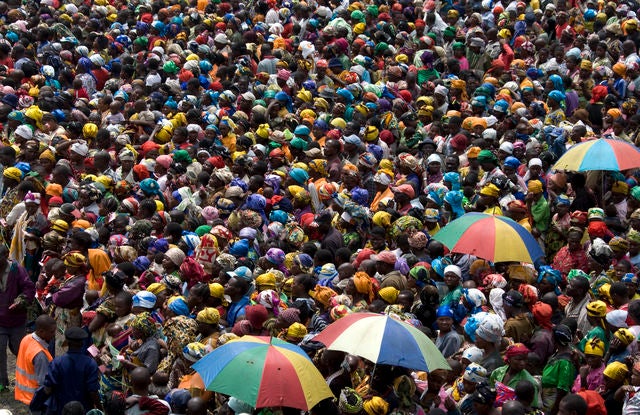A world of eight billion people, eight billion opportunities
As the global population reaches its largest size yet, World Population Day 2022 calls for co-creating a world that is more resilient, equitable, and fuels greater opportunities for all

In a world already challenged by inequity, climate change, and a lack of health system resiliency, World Population Day 2022 sounds an important alarm: our global community, which will reach eight billion this year, will require increased efforts to safeguard its well-being, especially for those who are most vulnerable.
Our staggering population, which has grown sevenfold in the past 200 years, is rife with inequity. In 1800, one billion people inhabited the earth, compared to today’s 7.9 billion. In the past 70 years alone, the global population has tripled in size. And according to the World Bank, 689 million people still live in extreme poverty and survive on less than US$1.90 a day. That is also the case for 40 percent of the population of sub-Saharan Africa, and for a significant number of people in the Middle East and North Africa, who from 2015 to 2018 saw extreme poverty rates double from 3.8 to 7.2 percent.
Population and equity cannot be decoupled. Access to voluntary modern contraception, among the first harbingers of a country’s population growth, is “a precondition for women’s empowerment,” according to the International Conference on Population and Development. Access to sexual and reproductive health services allows women to plan their pregnancies, which also helps prevent maternal and newborn deaths, and enables a diverse family structure that allows women to be better integrated into a country’s economic activity.
Dr. Nyovani Madise, of the African Institute for Development Policy, highlighted this in a recent interview. She referenced a 2015 McKinsey report that showed achieving gender equality by 2025 could add US$12 trillion to the global economy. “Women's issues affect all the Sustainable Development Goals. To address poverty, for example, we must understand that women who are unhealthy can't really contribute economically. We need to highlight the importance of women and girls, particularly in terms of education, of being healthy, so they can be empowered to contribute to our continent’s achievement of the SDGs.”
Population and the effects of climate change also cannot be decoupled. According to the US Centers for Disease Control and Prevention, increasing temperatures, extreme weather, and rising sea levels, all create air, food, and water quality problems, contributing to changes in infectious agents and population displacement. All of which tend to more severely affect the underserved.
“Unchecked, climate change will push up to 130 million people into poverty over the next 10 years – unraveling hard-won development gains – and could cause over 200 million people to migrate within their own countries by 2050,” the World Bank’s Vice President of Development Finance, Akihiko Nishio, noted in a blog last year.
And finally, access to basic health care cannot be decoupled from the effects of population growth. Primary health care (PHC) can meet up to 90 percent of a person’s health care needs over their lifetime. But nearly 50 percent of the world’s population still lacks access to PHC. The WHO estimates that scaling up access to PHC interventions – especially in countries that experience extreme poverty – could save as many as 60 million lives by 2030.
According to research by Exemplars in Global Health, "high-quality, accessible PHC gives health systems the capacity to serve a large and diverse set of health needs all at once, it can serve as the service delivery platform for approaches that are often disease-specific such as tuberculosis or HIV treatment programs." For a world that keeps growing, a strong PHC system can also ensure populations most vulnerable or hard to reach still have a shot at a healthy life.
A global population of eight billion people can mean “eight billion opportunities for healthier societies empowered by rights and choices,” as the UN has stated in its World Population Day 2022 call for action. But because the playing field is not even, it added, “we do ourselves no favors when neglecting those left behind.
And even though the world is not expected to see its population double again any time soon (the global demographic transition is expected to come to a balance), our shared challenges must be addressed if we are to be a world of eight million where – as the UN has stated – "health, dignity, and education are rights and realities, not privileges and empty promises.”
How can we help you?
believes that the quickest path to improving health outcomes to identify positive outliers in health and help leaders implement lessons in their own countries.
With our network of in-country and cross-country partners, we research countries that have made extraordinary progress in important health outcomes and share actionable lessons with public health decisionmakers.
Our research can support you to learn about a new issue, design a new policy, or implement a new program by providing context-specific recommendations rooted in Exemplar findings. Our decision-support offerings include courses, workshops, peer-to-peer collaboration support, tailored analyses, and sub-national research.
If you'd like to find out more about how we could help you, please click . Please consider so you never miss new insights from Exemplar countries. You can also follow us on Twitter and LinkedIn.
